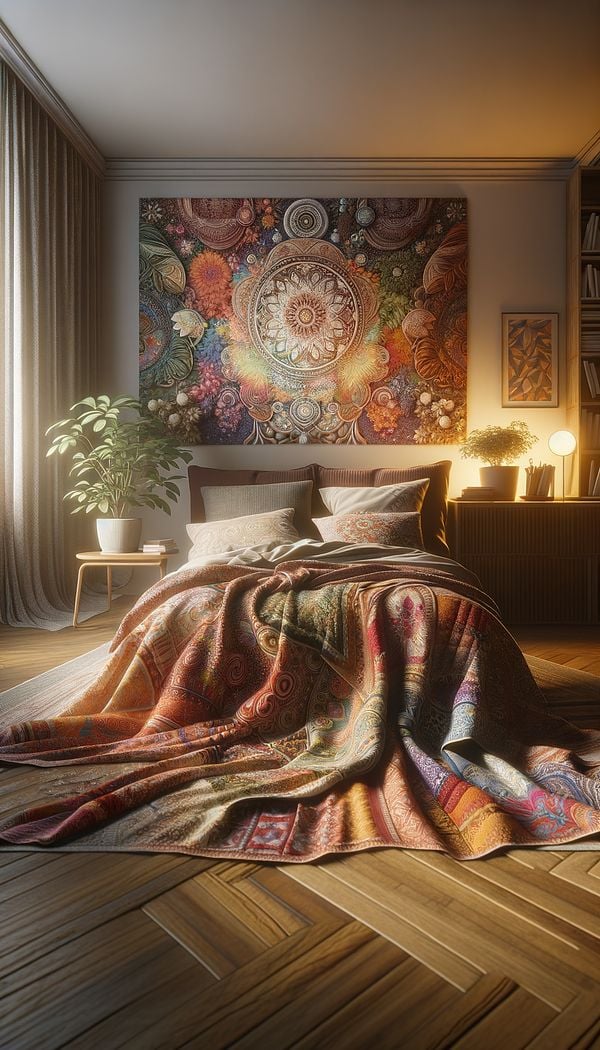What is a Quilt?
A quilt is a multi-layered textile comprised of a woven cloth top, a layer of batting or wadding, and a woven back, combined using the technique of quilting.
Description
A quilt is essentially a three-part sandwich, marvelously versatile in its function and design, primarily used in interior design for warmth and decorative purposes. At its core, the quilt is a textile construction that layers a top, bottom, and middle section of batting or wadding, all bound together through the process known as quilting. This process involves stitching these layers together in a decorative pattern, which can range from simple linear designs to intricate motifs.
The top layer of a quilt usually features pieces of fabric sewn together to form a design or pattern. This is where the artistry of quilting truly shines, as designs can be anything from geometric patterns to narrative scenes, allowing for a high degree of personal expression and thematic relevance to the space it occupies. The bottom layer, or backing, is typically a single, cohesive piece of fabric, providing stability and contrast to the detailed top layer.
Quilting holds a rich place in history, with diverse techniques and styles that have evolved over centuries across cultures. Today, quilts serve as a compelling blend of artistry, craft, and function within an interior space, offering both warmth and a visual feast.
Usage
In interior design, quilts are often used as bed coverings, adding both comfort and style to a bedroom. They can also serve as throw blankets in living areas, wall hangings for artistic display, or even as tablecloths, illustrating their versatile role in home décor. Quilts can be custom-made or bought ready-made, allowing for personalization in style, color, and design to fit any room's theme or aesthetic.
FAQs
-
How do you maintain a quilt?
Quilts can be maintained by regular light cleaning and, depending on their material and construction, may be washed gently by hand or in a machine on a delicate cycle. Always consult the care instructions, as antique or handcrafted quilts might require special care.
-
Can any fabric be used to make a quilt?
While a wide range of fabrics can be used to create a quilt, it's essential to choose compatible textiles in terms of weight, durability, and washability. Cotton is a popular choice due to its versatility and ease of care.
-
How do quilts incorporate into modern interior design?
Modern interior design often uses quilts as multifunctional decor pieces, playing with patterns, colors, and textures to add warmth and character to spaces. They can effectively tie together decorative themes or stand as a focal point in minimalist settings.
-
Can quilting be considered an eco-friendly design choice?
Absolutely. Quilting can be an eco-friendly design choice, particularly when upcycling fabrics or using sustainable materials. It exemplifies the principles of sustainability by extending the life of materials and adding a personal, handcrafted touch to interiors.
-
Are quilts suitable for all seasons?
Yes, quilts can be tailored for all seasons by adjusting the batting thickness and fabric types used. Summer quilts may have lighter batting, while winter quilts feature heavier, more insulating materials.
Practical Application
When incorporating quilts into your interior design, consider their color, pattern, and texture to ensure they complement your existing décor. For a unified look, pick quilts that reflect the color scheme or theme of your room. Consider their placement, whether as a comforting layer on your bed or as an aesthetic feature hung on a wall, to enhance both comfort and style in your home.
-
Decorative Objects240 articles
-
Decorating Principles & Elements330 articles
-
Textile Techniques10 articles
-
Materials & Textiles360 articles
-
Textiles & Upholstery252 articles
-
TextureTexture refers to the tactile surface quality of materials or objects within an interior space.
-
BurlBurl is a tree growth in which the grain has grown in a deformed manner.
-
Egyptian CottonEgyptian Cotton is a luxurious type of cotton known for its long fibers.
-
Focal PointA focal point is a specific spot or area in a space that draws attention and becomes the center of interest.
-
DecoupageDecoupage is a decorative technique where cutouts are glued to a surface and then varnished.
